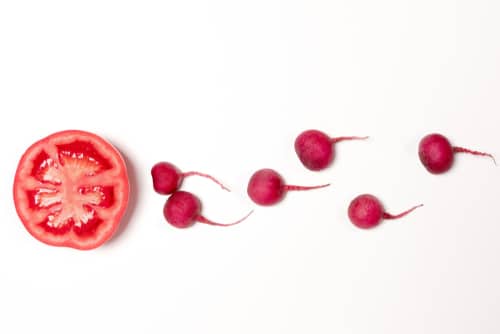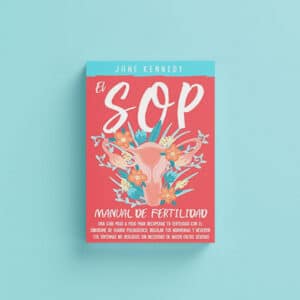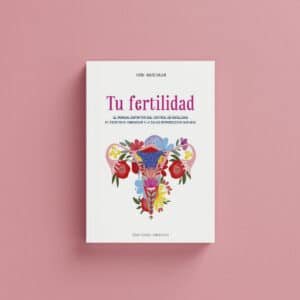Do polycystic ovaries affect fertility?
It is very likely that if you have Polycystic Ovary Syndrome (PCOS) and are starting to try to get pregnant, you will wonder if it can affect your fertility.
Or maybe you have even started google (mistake!) and you were scared because you read that polycystic ovaries make it difficult to get pregnant.
In this article we are going to look in depth at what exactly PCOS is and how it affects fertility. And as always, from a scientific perspective but explained so that you understand it.
What exactly is Polycystic Ovary Syndrome or PCOS?
It is an abnormal hormonal condition that affects ovulation and the morphology (shape) of the ovaries.
Women with PCOS have higher levels than other women of the male hormone, androgens, and have problems with the management of another hormone, insulin. This hormonal disorder causes a greater number of follicles to be produced, but they do not mature and complete ovulation.
This surplus of follicles encysts and, in most cases, creates polycystic ovaries.
It is true that PCOS is one of the most common causes of infertility today.
What are the causes of Polycystic Ovary Syndrome?
It is believed that the causes of the development of symptoms are a combination of genetic predisposition, prenatal and postnatal environmental factors, excess oxidative stress, situations of low-grade inflammation, and alterations in lipid and insulin metabolism.
Studies on polycystic ovaries and fertility
It affects between 5% and 20% of women of reproductive age. These women tend to have a lower natural pregnancy rate, a higher biochemical pregnancy rate, and a reduced response to assisted reproduction treatments.
Surprisingly, a 2019 study provides good news for women suffering from PCOS. The study concludes that these women, throughout their lives, have a similar pregnancy rate to women who do not suffer from this pathology, although it takes longer and they usually need some type of help to achieve it.
How do I know if I have PCOS? What are the symptoms?
Be careful, let's clarify concepts well. You can have ovarian cysts and not have PCOS and you can have PCOS without having polycystic ovaries. It seems like a tongue twister but that's how it is.
To suffer from PCOS, three of these four cases must occur:
- Clinical hyperandrogenism: excess body hair such as beard, sideburns, arms, back, abdomen, etc.
- Biochemical hyperandrogenism: excess androgens, more LH (luteinizing) hormone than FSH (follicle-stimulating).
- Oligo or anovulation: irregular cycles and irregular ovulation.
- More than 12 follicles in the ovaries according to ultrasound analysis.
In addition to having three of these four assumptions mentioned above, there are some other symptoms that can give you clues:
- Overweight.
- Insulin resistance: abdominal fat.
- Diabetes.
- Adrenal phenotype: masculine shapes and tendency to bodybuilding.
- Absence of hair on the head.
- Acne.
- Infertility.
- Complications during pregnancy: preeclampsia, prematurity, gestational diabetes.
How does PCOS affect fertility?
A woman with Polycystic Ovary Syndrome will take longer to achieve a viable pregnancy. This is mainly because their irregular cycles reduce the number and quality of ovulations and, therefore, the possibilities of fertilization.
Being overweight is also a negative factor for fertility, which can add complications when it comes to getting pregnant. Studies show that weight loss between 5 and 10% can trigger regular ovulation.
Although it is not a direct relationship in all cases, weight loss usually makes medication to promote ovulation more efficient.
Of course, it must be taken into account that, despite suffering from PCOS, those women who do not want to become pregnant must still take contraceptive measures.
What can I do if I want to get pregnant and have PCOS?
This syndrome is a complex pathology and its treatment can have very different approaches for each woman, depending on which factor is having the most weight in the development of the pathology.
- The best recommendation will be to adopt a healthy life style that helps control body weight on the one hand and controls insulin peaks on the other.
- It is advisable to follow a diet low in simple carbohydrates and rich in fiber which, in addition to promoting weight loss, will help control insulin spikes that promote abnormal tissue growth and promote obesity. Cinnamon, Berberine or mate seem to have beneficial effects on insulin sensitivity. By reducing fat we eliminate a factor that disrupts hormonal balance.
- Ensure adequate intake of nutrients to have a thyroid in excellent condition and a sufficient amount of protein and fat to ensure hormone production. Eat seafood and fish regularly.
- Do not smoke and do not drink alcohol. This involves eliminating these oxidative factors that damage the already weak follicle.
- Ensure adequate sleep rhythms combined with regular exercise sessions. With them we will help recover oxidative damage on the one hand and regulate hormonal balance on the other. Regular exercise, combined with a healthier diet, is capable of improving cycle regularity by up to 50%.
- In the case of women with an adrenal phenotype, more masculine physical features (absence of curves, muscularity), lowering the stress level will be essential to control the production of male hormone.
- Supplements like Myo-inositol work on insulin sensitivity and increase sensitivity to ovarian-stimulating hormones (FSH). And taking foods rich in plant estrogens or supplements that contain them, during the first phase of the menstrual cycle, can help the maturation of the follicle and promote correct ovulation.
What does conventional medicine offer me for Polycystic Ovary Syndrome?
From the specialist doctor, the approach will be to force ovulation with certain medications (Clomid or Letrozole). or by using medication to control high insulin levels (Metformin).
Ultimately, if changing habits and pro-ovulation medication were not enough, assisted reproduction techniques such as insemination or in vitro fertilization would be proposed.
It may interest you:
related products



